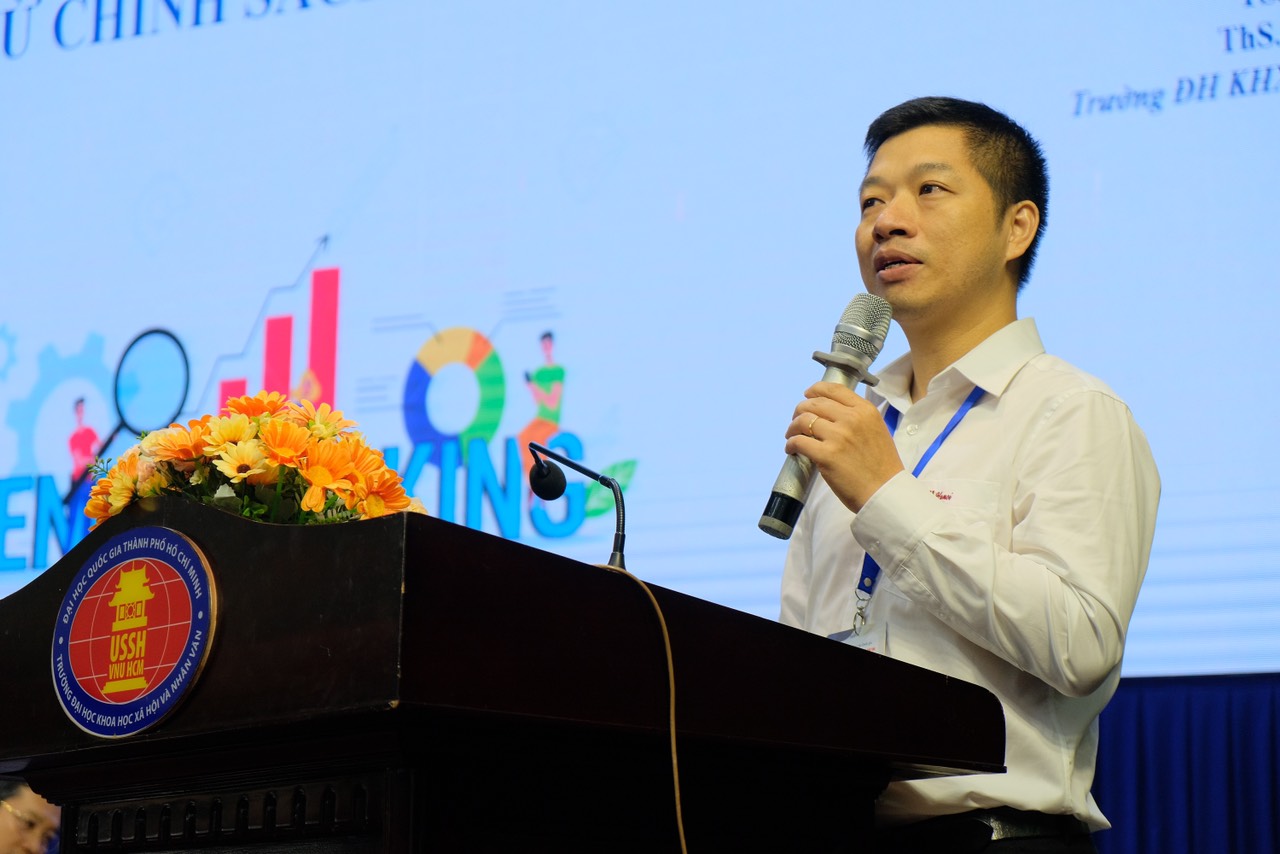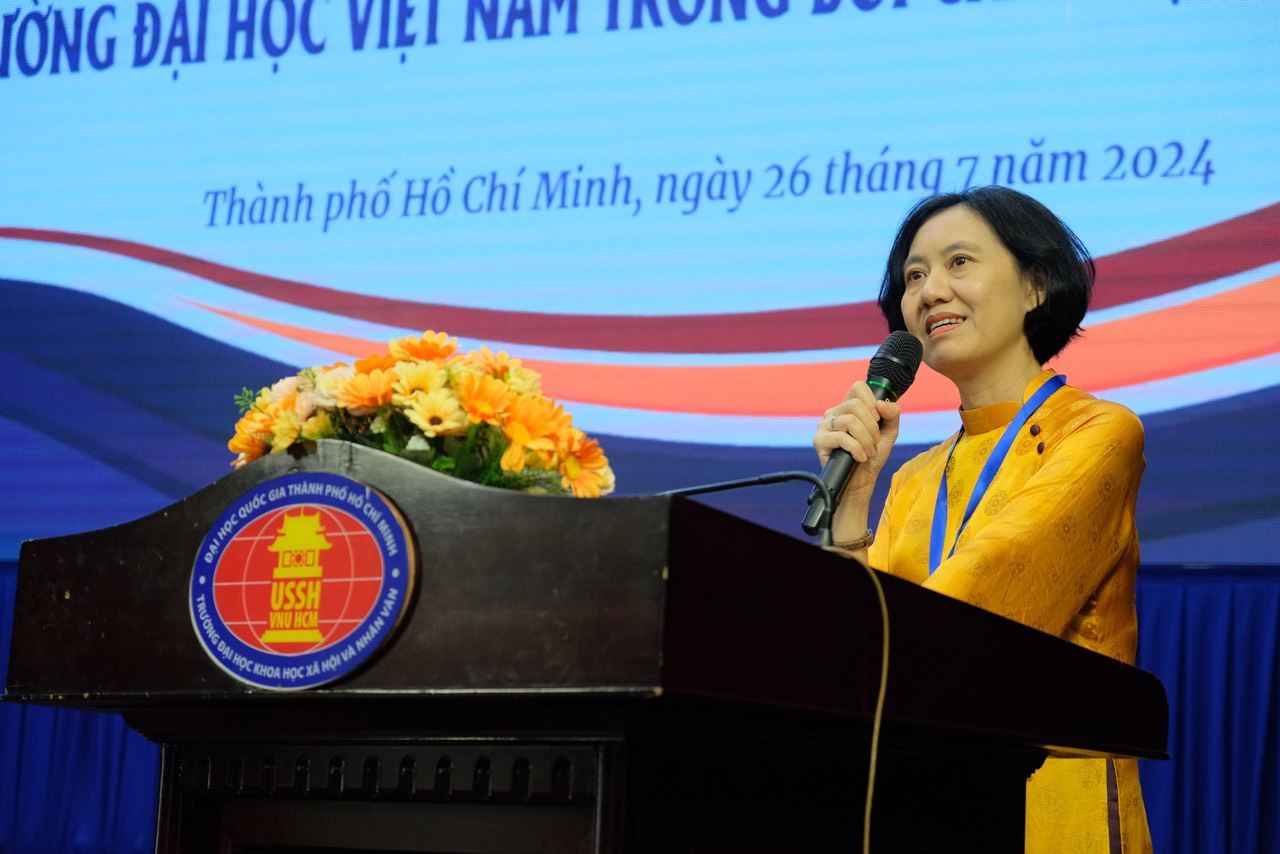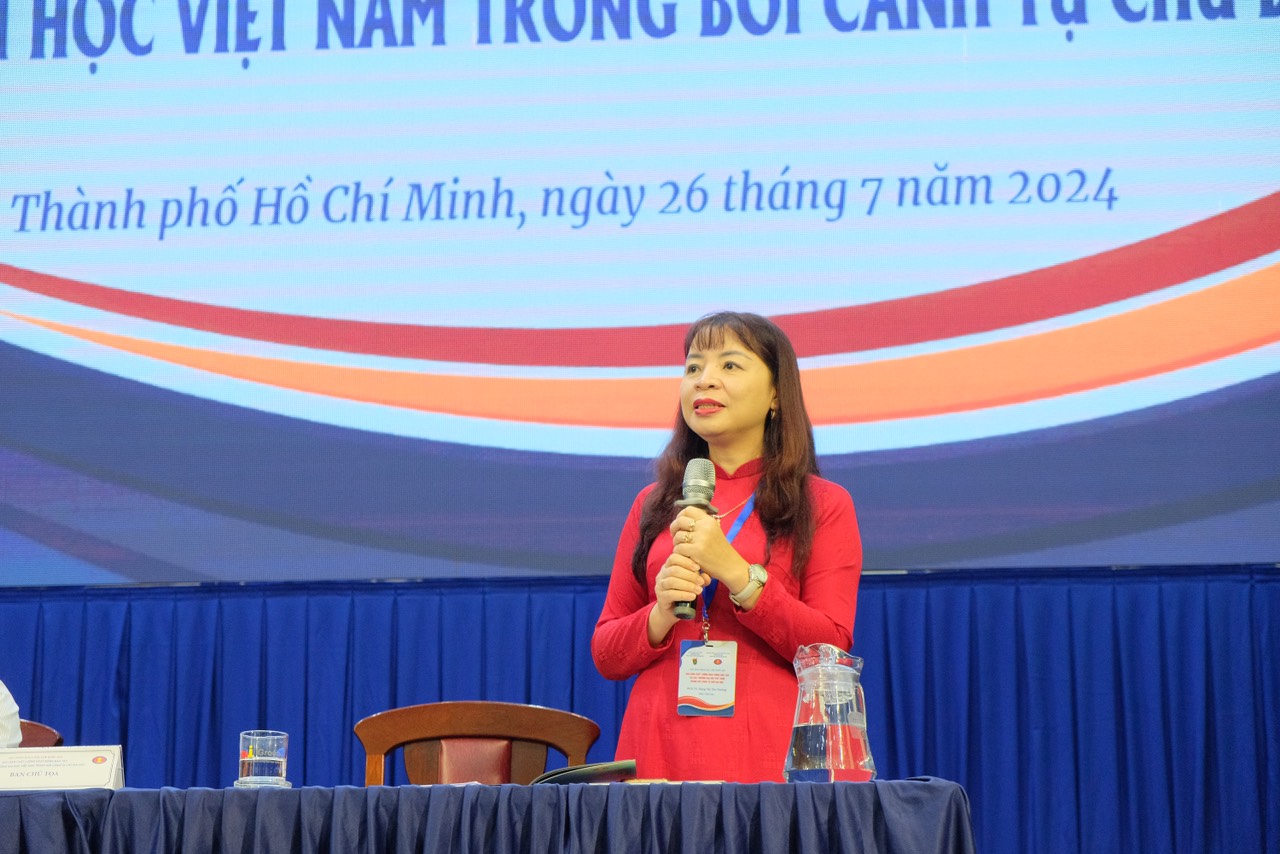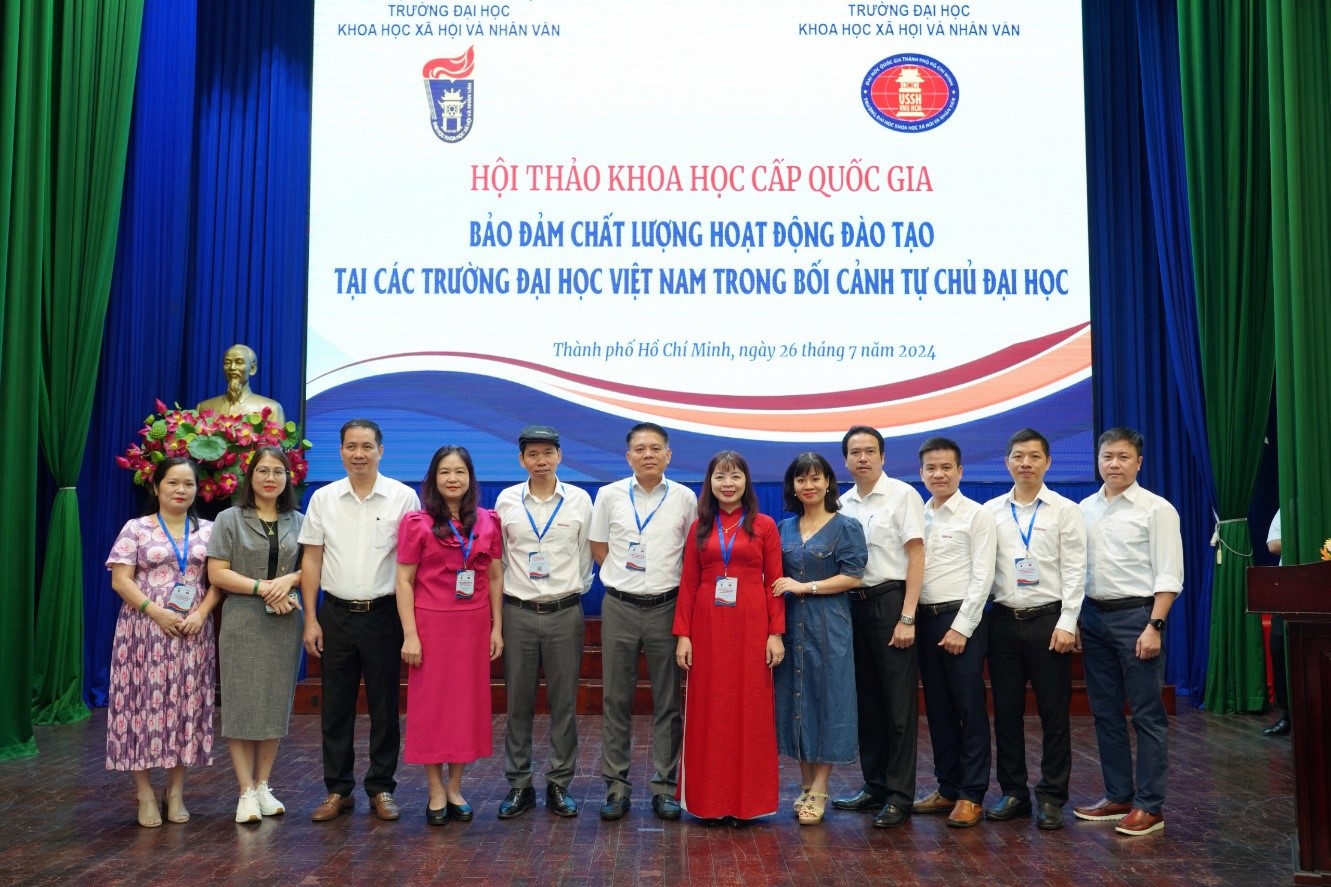The workshop was attended by leaders and lecturers from two Universities of Social Sciences and Humanities, scientists from many universities nationwide (Danang University, Fulbright University Vietnam, Phenikaa University, Gia Dinh University, Eastern International University, Hai Duong University, Ho Chi Minh City University of Technical Education...). This is a forum for scientists to exchange, learn, share experiences and propose initiatives and innovations in ensuring and improving the quality of training activities at higher education institutions to meet the requirements of domestic and international accreditation standards.
The workshop on ensuring training quality is divided into 04 sessions, including:
- General session
- Parallel session 1: Ensuring the quality of training programs
- Parallel session 2: Teaching, testing, and evaluating learning outcomes
- Parallel session 3: University autonomy, quality culture
Improving the quality of benchmarking activities in response to increasing demands for ensuring educational quality
Researching on policies and practices in quality comparison between educational institutions in Vietnam, Dr. Pham Huy Cuong (University of Social Sciences and Humanities, VNU) summarized the approaches to quality assurance and quality improvement that have been applied in higher education in the world as well as in Vietnam, emphasizing that in addition to quality assurance models such as accreditation, assessment, auditing, ranking, quality assessment through stakeholder feedback (survey), licensing, benchmarking is one of the approaches that is commonly applied and shows specific effectiveness for educational institutions.
The practice of Vietnamese higher education reflects that the quality accreditation mechanism is the main quality assurance tool (Nguyen Huu Cuong et al., 2019). Other approaches, including certification, quality assessment through feedback from stakeholders, university rankings as well as benchmarking and comparison, have also been gradually implemented from policy to practice levels. However, the systematicity, consistency and effectiveness still require urgent consideration and discussion for improvement.
From the policy analysis, the paper by the group of authors from the University of Social Sciences and Humanities, VNU (Pham Huy Cuong, Dang Thi Thu Huong, Nguyen Van Hong) evaluated the practical experience of comparison within and between Vietnamese educational institutions in general and between the two leading educational institutions in social sciences and humanities in particular, thereby giving some suggestions to contribute to improving the quality of comparison activities in response to the increasingly high demand for quality education in the context of university autonomy.
Dr. Pham Huy Cuong (University of Social Sciences and Humanities, VNU) presented a paper at the conference
At the discussion session with the topic "Ensuring the quality of training programs", scientists presented papers on the issue of improving the quality of training programs (CTĐT) at universities, the issue of monitoring CTĐT in reviewing and improving CTĐT; the relationship between the scores of standards related to training activities in the external assessment results according to the MOET standards and the rankings on VNUR 2024 of Vietnamese universities.
According to Associate Professor Dr. Bui Thanh Nam - University of Social Sciences and Humanities, VNU, the quality assurance system of training programs plays an important role in maintaining and improving the training quality of the university. Referring to the ongoing activities of building, reviewing, adjusting, improving the quality of training programs and proposing to build a quality assurance system within the training programs at the University of Social Sciences and Humanities, VNU, Associate Professor Dr. Bui Thanh Nam emphasized that this system is built based on the mission, strategy, development goals and requirements of the relevant parties to ensure the quality of input, training process, output quality and quality improvement process after assessment. In addition, this system operates effectively to ensure the effectiveness of the PDCA cycle in quality management.
The necessity of CTDT monitoring and digital transformation in higher education
According to Dr. Cao Thi Chau Thuy (University of Social Sciences and Humanities, VNU-HCM), reviewing and improving training programs is an activity that needs to be carried out to train a workforce that meets the requirements of employers. Currently, universities have tools such as regulations, processes, policies, software... to manage and ensure the quality of training programs. However, the current situation in postgraduate training at University A shows that tools are a necessary but not sufficient condition to complete the review and improvement of training programs. There are many aspects that need to be considered and clarified such as: the capacity to develop training programs of faculty-level managers; the roles and tasks of parties related to training program development...
Based on the results of the current research, scientists found that "Program monitoring activities" should be proposed to support the achievement of the goal of reviewing and improving training programs; supporting the management of training program quality assurance. "Program monitoring activities are not simply an administrative management task but should be considered as an effective tool to improve and enhance teaching quality, meet the needs of stakeholders and be consistent with the development of higher education" - Dr. Cao Thi Chau Thuy emphasized.
In a study on the selection of learning outcome testing methods and a model for measuring the output standards of training programs, a group of authors from Phenikaa University (Dr. Nguyen Van Hung, Dr. Mai Xuan Trang, Dr. Pham Tien Lam, MSc. Nguyen Hai Anh) said that through analyzing learning outcome testing methods in accordance with Bloom's taxonomy, it shows the diversity and flexibility in testing and evaluating learning outcomes to meet output standards.
In addition, the group of authors introduced practical lessons on the results of measuring the level of output standards that satisfy the requirements of international program quality accreditation agencies such as ABET, FIBAA, AUN-QA; and proposed a model for measuring the level of output standards that has been successfully used in the quality accreditation of training programs according to international standards for educational institutions to refer to.
From the research results, scientists suggest: the selection of the method to measure the level of output standards should be consistent with Bloom's taxonomy. Improving the training program is a continuous and closed process with full participation of the program's stakeholders. The 4-stage process of assessment, measurement and improvement shows that the level of output standards of learners has improved significantly.
The group of authors Nguyen Van Hong and Dao Minh Quan (University of Social Sciences and Humanities, VNU) emphasized that in the context of the strong development of the fourth industrial revolution, higher education, with its main task of training human resources, implementing scientific research and technology transfer, promoting international cooperation, will play a pioneering role in digital transformation (DX) to contribute to the successful implementation of the national DX strategy.
To successfully implement the digital transformation (DTS) process in training activities, it is necessary for higher education institutions in general to identify the conditions to ensure this process takes place as well as consider and select solutions suitable to the characteristics of each training institution.
Dr. Hoang Mai Khanh (University of Social Sciences and Humanities, VNU-HCM) presented a report at the Conference
The speakers proposed a number of orientations and solutions to effectively implement digital transformation activities, in which universities need to develop detailed strategies and plans for digital transformation, invest in digital infrastructure, digital platforms and data, and train and foster digital skills for staff, lecturers and students, focusing on connection, interaction and information security.
Associate Professor, Dr. Dang Thi Thu Huong (Vice Principal of University of Social Sciences and Humanities) delivered a closing speech at the discussion session.
Delegation from the University of Social Sciences and Humanities, VNU attended the workshop in Ho Chi Minh City
Related news:
Continuously improve quality to meet the needs of learners and society
Quality assessment of 03 university-level training programs: Quality culture is the core value of VNU-USSH
Training to improve capacity in implementing university ranking work at the University of Social Sciences and Humanities, VNU



